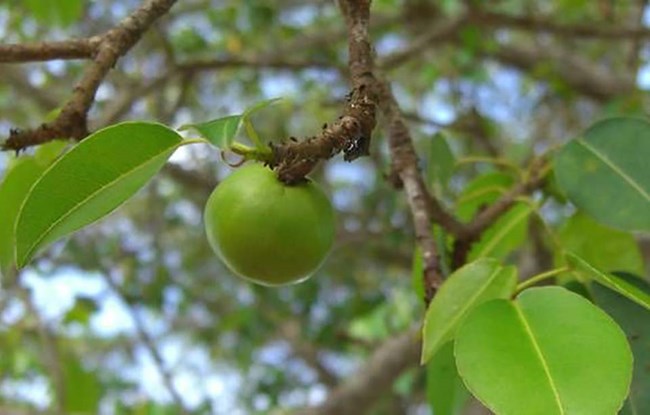The manchineel tree might be endangered, but so is anyone who messes with it. That’s because this atypical tropical plant, which has misleadingly sweet fruit, is one of the most poisonous trees in the world.
Manchineels are infamous in their native habitats, the Caribbean, South Florida mangroves, South America, and Central America. Many are branded with warning signs, but besides from poisoning Ponce de Leon, book characters, and tourists, the manchineel tree is relatively obscure considering it holds the world record for the most dangerous tree.
The fruits are a clear threat, earning manchineel the name “little apple of death” or “manzanita de la muerte.” The fruit looks like a small, green crabapple. However, these sweet-smelling fruits can bring hours of agony, and possibly death, with just one bite. Poison apples are just the tip of the iceberg. Interaction, including just standing near it, can be deadly. Touching the leaves, bark, or getting one drop of sap on your skin will scorch it. You’re in trouble if you are near a manchineel tree and rain washes the sap off the branches onto you.
The tree has numerous toxins, like hippomanin A and B. Some react quickly while others take their time with the reaction. Symptoms of contact with sap go from headaches to acute dermatitis to difficult breathing problems to rashes. Chopping the wood isn’t a good idea because the sawdust burns the lungs, eyes, and skin.
While it’s not as well-known as hemlock or poison ivy, manchineel at least has a bad reputation among endangered plants, most of which aren’t publicly known. Respect for its risks and advantages may give it an edge over endangered plants with less star power.
If you have a manchineel tree on or near your property, contact a professional Tampa tree removal business to handle the work. This is definitely one time you don’t want to be attempting a DIY tree removal project.
People usually leave manchineel trees alone, for understandable reasons and because even this poison-obsessed tree delivers ecosystem services. It combats beach erosion and is a natural windbreaker. This service is useful with the rise of sea levels and bigger storms across the Atlantic.
Since biotoxins can motivate useful scientific discoveries such as pain medicine from cone snails or non-dangerous pesticides from scorpion venom, it might help to keep manchineel trees around. Just make sure you put lots of distance between you two.



